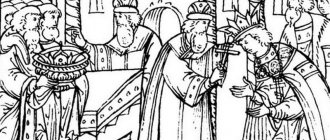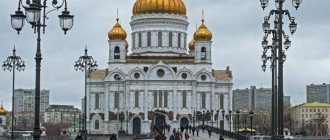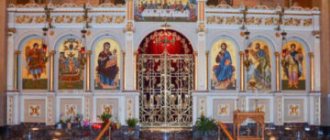No religion in the world has suffered such severe and persistent persecution as Christianity. We can say that Christianity has always been oppressed - to one degree or another. But of course, the most brutal bloody persecution of Christians took place in the first centuries of our era.
The very fact that Christianity survived, did not dissolve and did not sink into oblivion is already a clear sign of Divine blessing. It is impossible to even imagine that a cult invented by people, empty in its essence, could endure such humiliation as Christianity went through.
Persecution of Christians in other centuries
Often, the period of persecution of the Christian faith is assumed to be precisely the initial period of the Roman Empire. Of course, then there were oppressions that were horrifying in their bloodiness, and many martyrs emerged from the first centuries. Nevertheless, after Christianity won the right to exist not only in the East, but also in many other countries, one way or another it was almost always persecuted.
Catholic persecution in the Middle Ages
Let us briefly highlight the main stages of humiliation in different regions of the world. Thus, in medieval Europe, in England faced the most trials - the emergence of a new religion in the land of barbarians caused fear of the destruction of familiar traditions and way of life. At the same time, the Arabs began their campaigns of conquest on Spanish lands, where they also exterminated unwanted believers.
In the 10-11th century, when, it would seem, the position of the Christian Church in Europe was already quite strong, pagan Danish troops invaded England. They also did not like the religion, which did not recognize their pagan gods and cults, so Christians were exterminated.
At the same time, in the Middle East, under the leadership of Caliph al-Hakim, the most massive repressions and persecutions against Christians took place in these lands.
In the 14th-16th centuries in the Balkan countries , where there was already a large Christian population, there were conquests and invasions of the Turks. They were also intolerant of the local religion, oppressing believers in every possible way.
In the 17th century , Japan, in order to protect its territory from attempts at colonization, completely closed itself off from any external influence. Those Christians who were already there formed a continually disparaged minority until the mid-19th century.
Another confrontation between the forces of the West and the East led to the execution of 8,000 Christians in Korea in 1870. Three decades later, in China , where 30 thousand believers from various Christian denominations were killed over several years. In our Church you can find the names of 222 officially canonized Chinese martyrs.
Syria
In Syria, the Christian community is represented by the Antiochian and Syro-Jacobite Orthodox churches, as well as the Armenian Apostolic, Melkite and Maronite Catholic churches.
Before the outbreak of the civil war in 2011, approximately 2 million Christians lived in the country (about 10% of the total population of the country). Already in 2012, their share, according to some estimates, decreased to 8%. In 2012-2014 Another million Christians left the country. Almost the entire Christian population fled from Homs - about 140 thousand people. The rest were almost completely destroyed by the militants. Terrorists use a wide arsenal of intimidation methods: kidnappings, forced conversion to Islam, torture, rape, public executions.
In December 2013, 12 Orthodox nuns and four novices from the monastery of St. Thekla, led by Mother Superior Pelageya (Sayaf), were kidnapped; the nuns were subsequently released.
There is still no information about the fate of the Christian archpastors kidnapped in April 2013: the hierarch of the Antiochian Orthodox Church, Metropolitan Paul of Aleppo and the Metropolitan of the Syrian Orthodox Church, Gregory John Ibrahim (in December 2015, unconfirmed information about their execution appeared in the media). In occupied territories, Islamists, as in Iraq, often impose a jizya tax on non-Muslims.
From March to June 2014, the Syrian town of Kessab, populated predominantly by ethnic Armenian Christians, was besieged by Islamic extremists. The city suffered significant destruction, thousands of families were forced to leave their homes.
On February 22, 2015, IS militants carried out massacres against representatives of the Christian Assyrian community in the vicinity of the city of Tell Tamer in northwestern Syria. The militants burned dozens of civilian houses, as well as two ancient Christian churches.
According to the Russian Orthodox Church, Islamic militants destroyed about 400 Christian churches during the civil war in Syria.
Persecution in Russia at the beginning of the 20th century
In the 19th century, revolutionary ideas began to actively grow in Orthodox monarchical Russia. There were many reasons and reasons for this, including internal problems in the Church. In many places, faith has become a formal ritual, or even an instrument of intimidation and punishment. The tension grew, culminating in the 1917 revolution and the Bolsheviks coming to power.
Under Soviet rule, many churches were destroyed
From the very beginning of the new government, the Orthodox faith was rejected as a relic of the past. Progressive Soviet people were encouraged to believe in man, society and work. The existence of God was denied in principle, Christian values were ridiculed despite the fact that many communist ideas were directly based on biblical thoughts.
Interesting! For example, the well-known Soviet slogan “He who does not work, neither shall he eat” directly echoes the words of the Apostle Paul from the Second Epistle to the Thessalonians, chapter 3, verse 10: “If anyone does not want to work, neither should he eat.”
Believers who firmly stood in Orthodoxy were repressed. They were sent into exile, where conditions of detention and hard work did not allow many of them to survive. Many were simply shot without trial or investigation - sometimes a denunciation from neighbors was enough for this.
Practicing the Orthodox faith was often equated with anti-Soviet activities and propaganda that violated the foundations of communist society. Behind this pompous formulation are thousands and thousands of human lives.
Story
From its origins until its legalization under Constantine, Christianity had no official status in the Roman Empire. During the first two centuries, Christianity and its followers were viewed with suspicion by much of the empire's population. They were considered members of some kind of "secret society" who communicated through secret signs and shunned polite society, so in the beginning there was public hostility and mob anger against Christians rather than official action. The first known attempt to formulate an official position was made by the imperial legate in the province of Bithynia and Pontus, Pliny the Younger, who, in his letter to Trajan, reported that he had received a large number of anonymous denunciations against Christians, and asked for advice, since he considered the matter serious. The emperor’s answer, in fact, an official document, a rescript, boiling down to the fact that Christians should not be specifically sought out, and if they are exposed and renounce their faith, then they should be released, confirmed by Hadrian in 125, set the direction of imperial policy towards Christians for the coming decades. However, the practical consequence of Trajan's rescript was that identified, confessed, and non-renounced Christians were subjected to torture and execution, as happened in 177 in Lyon and Vienne, when the intervention of civil authorities prevented a mob of townspeople from dragging Christians from their homes and beating them to death. The proconsul, who applied for the emperor’s decision, received from Marcus Aurelius, who was ruling at that time, the following decision: to execute those who were firm in Christianity, to execute Roman citizens with the sword, to kill others, and to release apostates.
The original refuges of the first Christians were the Roman catacombs. They were narrow underground passages, the exact origin of which has not been established, but there is an assumption that these were quarries in which the Romans extracted numerous resources for buildings. Later it was believed that these were in fact cemeteries. Expanding more and more, the catacombs turned into a network of corridors and halls with a length of eight hundred and sixty kilometers. The number of people buried there cannot be counted.
On the contrary, the name of faction should be given to those who conspire to hate good and honest people, who unanimously demand the blood of innocent people, hiding behind the false opinion to justify their hatred that they, Christians, are the culprits of every social disaster, every national misfortune. If the Tiber entered the walls, if the Nile did not overflow the fields, if the sky did not give rain, if an earthquake occurred, if there was a famine or epidemic; then they immediately shout: Christians to the lion.
Tertullian, Apology, chapter 40
For followers of traditional Roman cults, Christians were too strange - not quite barbarians and not quite Romans. Their religious practices challenged traditional principles. Christians refused to celebrate national holidays, participate in events of the imperial cult, and publicly criticized ancient customs. Justin the Philosopher reports about a pagan husband who denounced his Christian wife, Tertullian about children who were disinherited after converting to Christianity. Traditional Roman religion was inextricably linked to Roman society, and Christians rejected both. According to Tacitus, by doing this they showed “hatred of the human race.” There were widespread ideas about Christians as practicing black magic (lat. maleficus) to achieve their goals, as well as practicing incest and cannibalism.
However, in the first two centuries of Christian history, no laws were passed against Christians, and persecution was carried out only on the initiative of local authorities. This happened in 111 in Bithynia-Pontus under Pliny the Younger, in Smyrna in 156 - the martyrdom of Polycarp of Smyrna, the first about which there is relatively reliable information, Scylla near Carthage in 180 by order of the proconsul, etc. When Emperor Nero executed Christians after the fire of 64 years, this was an exclusively local matter, not extending beyond the borders of Rome. These early persecutions, although brutal, were sporadic, short, local, did not pose a threat to the Christian community as a whole, but nevertheless deeply influenced the worldview of the early Christians.
By the 3rd century the situation had changed. Emperors and regional officials began to actively and on their own initiative persecute Christians. Those, in turn, also changed, and wealthy and noble citizens of the empire appeared among them. Origen, who wrote about this in 248, Fr. One of the first laws against Christians was a decree issued in 202, as reported by the History of the Augustans, by Septimius Severus prohibiting conversion to Judaism or Christianity. After a lull that lasted until the assassination of Emperor Alexander Severus, Christian leaders became the target of Maximinus (235-238); Decius (249-251) demanded the universal and explicit practice of pagan rites. Christians persisted in their reluctance to swear allegiance to the emperor, resulting in their leaders being tortured and executed, as in the case of Bishop Fabian of Rome and Bishop Babyla of Antioch. Ordinary believers also suffered, such as Pionius of Smyrna and many others who were martyred under Decius.
The persecution under Decius was a heavy blow to the church. Mass renunciations took place in Carthage and Alexandria, and in Smyrna the local bishop Euctemon called for this. Since the church was predominantly urban, it was not difficult to identify and destroy its hierarchy. The edicts of Decius have not survived and their meaning can only be judged from indirect information. It is assumed that they were directed against the higher clergy and ordered a general sacrifice. Valerian's first edict, issued in 257, ordered clerics to make sacrifices to the Roman gods; refusal would result in exile. In addition, under threat of the death penalty, it was forbidden to perform religious services and visit burial sites. The period of the first edict dates back to the martyrdom of Pope Stephen I, executed in 257. The following year, a more severe law was adopted, according to which clergy were to be executed for refusing to obey, noble laymen of the senatorial and equestrian class were to be deprived of their dignity and subject to confiscation of property, in case of persistence - to be executed, their wives to be deprived of property and exiled, persons who were imperial service - deprived of property and sentenced to forced labor on palace estates. In June 251, Decius died in battle without completing this process. There was no persecution for the next six years, which allowed the church to recover. In 253, the throne was taken by Decius's friend, Valerian, who initially impressed his contemporaries as a friend of Christians, despite the fact that in 254 the theologian Origen was tortured and soon died. However, in 257, he issued an edict condemning Christians to exile and hard labor, and then another one establishing the death penalty for them as punishment. However, the captivity and death of the emperor in 260 suspended the persecution, and Valerian’s son and successor, Gallienus (260-268), established “peace of all churches,” which lasted until the reign of Diocletian.
Iran
Type of persecution: Islamic oppression
Approximate number of Christians: 800 000
How Christians are suffering: The Iranian government views the conversion of Muslims to Christianity as an attempt by Western countries to undermine Iran's Islamic rule. Christians of Muslim origin are the most persecuted, primarily by the government, but also by their families and communities. Secret churches are often raided, and their leaders and members are arrested and given long prison sentences for “crimes against national security.”
What to Pray : Pray for Christians who are currently in prison for their faith. Conditions in Iran's prisons are very poor, and the pandemic has only made the situation worse.
North Korea
Type of persecution : communist and post-communist oppression
Estimated Number of Christians: 400 000
How Christians Suffer : If a person is discovered to be a Christian, in North Korea it means a death sentence. If you are not killed immediately, you will be sent to a labor camp as a political criminal. These inhumane prisons have terrible conditions, and few believers survive there. Everyone in your family will receive the same severe punishment. Kim Jong Un has reportedly expanded his system of prison camps, which currently house an estimated 50,000 to 70,000 Christians.
What to Pray : Pray for imprisoned believers. Pray for comfort and strength for them, and that even in prison they will experience God's presence and love.
Periodization
Christian tradition, first recorded by Lactantius in his treatise “On the Deaths of the Persecutors,” identifies 10 persecutions:
- Under Nero, which began after the Great Fire of Rome in 64;
- Under Domitian in 81;
- Under Trajan in 99, about which we know from the letters of Pliny the Younger;
- Under Marcus Aurelius in 168;
- Under Septimius Severus in 192;
- Under Maximin in 235;
- Persecution of Christians under Decius in 250;
- Under Valerian in 257;
- Under Aurelian in 272;
- The Great Persecution of Diocletian and Galerius from 303 to 313.
Are they sure they die for their faith, and not during military operations?
Most Christians die precisely for their faith. They blow up churches, kidnap Christian bishops and priests, and offer to renounce Christ and convert to Islam or other religions. They are accused of proselytism, forbidden to read the Bible and other Christian literature, publicly executed, desecrated shrines, and accused of blasphemy.
Of course, Christians, for example in Syria, like other people, suffer from war, but in addition to the humanitarian catastrophe, there is also open persecution. In the fall of 2013, in the Christian city of Sadad in Syria, after its liberation from militants, mass graves were found containing the bodies of 45 beheaded Christians.
Pakistan
Type of Persecution: Islamic Oppression
Approximate number of Christians: 4 052 000
How Christians Suffer: Christians in Pakistan face severe persecution in all walks of life. Believers who convert from Islam face the most severe persecution, and all Christians are considered second-class citizens in this strictly Islamic country. They are given jobs that are considered low, dirty and shameful, and may become victims of forced labor.
What to Pray : Pray for the protection of Pakistani churches, especially during holidays such as Christmas and Easter, which have seen terrorist attacks in the past.
Yemen
Persecution Type: Clan Oppression
Approximate number of Christians: several thousand
How Christians Suffer: Christians in Yemen typically keep their faith secret because they face the death penalty if discovered. Leaving Islam is prohibited, and all Yemenis are considered Muslim by the state.
What to Pray : Pray for secret believers and secret house churches that they will have wisdom and discernment as they support believers.
Eritrea
Type of persecution: Christian denominational protectionism
Approximate number of Christians: 2 552 000
How Christians Suffer: Christians from non-traditional faiths face some of the worst persecution in Eritrea, both from the government and the Eritrean Orthodox Church (EOC). The EOC is the only Christian denomination recognized by the government, and it is tightly controlled by those in power.
What to Pray : Pray that Eritrean Christians and church leaders have the wisdom and ability to engage the government on the issue of religious freedom.
India
Type of persecution: religious nationalism
Estimated number of Christians: 67 356 000
How Christians suffer: Hindu extremists believe that all Indians should be Hindus and the country should get rid of Christianity and Islam. To achieve this goal, they use large-scale violence, especially targeting Christians of Hindu origin. Christians are accused of following a “foreign faith” and are blamed for the failures that occur in their communities. These believers are often physically attacked and sometimes killed, and are under constant pressure from their family and community to return to Hinduism.
What to Pray : Pray for the protection of our brothers and sisters, especially those who have recently come to Christ and those who live in rural areas and are isolated. Pray that God will help their families and communities embrace the new faith.
Author - Joe Carter / thegospelcoalition.org Translation - Oksana Burns for ieshua.org
Donate Last: 02/28. Thank you!
Subscribe: Telegram • Facebook • • • Twitter • Instagram • Youtube
Afghanistan
Type of persecution : clan and ethnic hostility
Approximate number of Christians : Possibly hundreds
How Christians Suffer : If a family finds out that one of their members has become a Christian, that family, clan or tribe must maintain their "honor" by disowning the believers or even killing them. Christians of Muslim origin may also be committed to a mental hospital because abandoning Islam is considered a sign of insanity.
What to Pray : Pray that despite their isolation, Afghan believers will be strengthened and encouraged in their faith. Pray that they will find safe ways to access God's Word and connect with other believers.
Libya
Type of Persecution: Islamic Oppression
Approximate number of Christians: 34 500
How Christians are suffering: Publicly sharing one's faith is illegal in Libya, and those who attempt to do so risk violent persecution and arrest. Without a central government, the country is effectively in a state of lawless anarchy. When Christians are attacked or killed, they have little chance of justice.
What to Pray : Pray for baptized converts. Pray that they will find a group of believers to join and rejoice that they have found Jesus.










